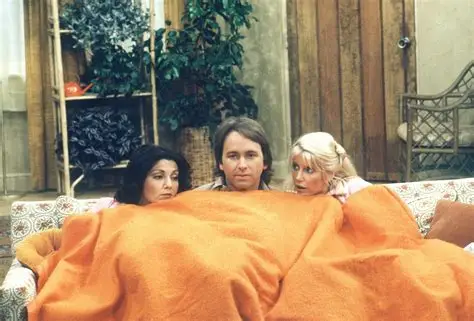
Come And Knock On Their Door: ‘Three’s Company’ Debuted On This Day In 1977
ByMarc Berman, Senior Contributor. Marc Berman is a New York-based reporter who covers media.
John Ritter Sighting at CBS TV City Taping – January 24, 1978
Joyce DeWitt, John Ritter, and Suzanne Somers After A Taping of “Three’s Company” at the CBS TV City … More
Ron Galella Collection via Getty Images
Flashback to March 15, 1977. ABC comedies Happy Days and Laverne & Shirley led the rating charts. Crime solvers Charlie’s Angels and Baretta and two movie nights were also perennial top 10 rated ABC entries. And the alphabet net was about to add two new long-running hits to its roster: sitcom Three’s Company and family dramedy Eight Is Enough, which both premiered on this day exactly 48 years ago.
Competitors CBS and NBC cornered the TV market on family-themed storytelling care of period pieces The Waltons and Little House on the Prairie. Now ABC wanted to capitalize on the genre, only this time with the modern day telling of a loving family with eight children dealing with the realities of life at the time in Sacramento, California.
Both Three’s Company and Eight is Enough were immediate hits in their abbreviated first seasons, but it was Three’s Company that roared right to the top of the charts. By season two it finished third overall behind Laverne & Shirley and Happy Days.
Why the hoopla?
Television at the time was smack in the Norman Lear era, where comedies like All in the Family, Maude, Good Times, The Jeffersons and One Day at a Time were tackling then taboo topics like racism, antisemitism, homosexuality, women’s liberation, abortion, infidelity, menopause, poverty, and the Vietnam War. But Three’s Company was the first comedy to feature two single women (Suzanne Somers as Chrissy Snow and Joyce DeWitt as Janet Wood) sharing an apartment with a single man (John Ritter), with Ritter’s Jack Tripper pretending to be gay to avoid clashing with cantankerous landlord Stanley Roper (Norman Fell). The sitcom’s success was fueled by the sexual innuendo and slapstick humor surrounding every situation, including Audra Lindley as Stanley’s sexually frustrated wife, Helen Roper.
Unlike the Norman Lear entries, the comedy on Three’s Company was not topical. Each episode was “comedy of errors” of sorts with some misunderstanding until the cast finally recognized the misjudgment and all returned to normal. Case point: Mr. Roper eavesdrops on the trio and comes to the conclusion that Chrissy is pregnant when all she was talking about was a wart on her finger.
Bitcoin Suddenly Braced For $7 Trillion ‘Critical’ Price Tipping Point After Stark BlackRock Warning
Google Confirms Gmail Warning—How To Keep Your Email Account
THREE S COMPANY
UNITED STATES – MARCH 15: THREE’S COMPANY – Cast gallery – Pilot – Season One – 3/15/77, Pictured, … More
Disney General Entertainment Content via Getty Images
Prior to Three’s Company, John Ritter has the recurring role of kindly Reverend Matthew Fordwick on The Waltons.
“I recall the conversation I had with John the day he got the offer to Three’s Company,” said Richard Thomas, who played oldest son John Jr. (“John Boy”) on The Waltons. “He wasn’t sure he wanted to take the risk, and I suggested that comedy would be a great segue from who viewers were accustomed to seeing him as. I told him to go for it.”
Forbes Daily: Join over 1 million Forbes Daily subscribers and get our best stories, exclusive reporting and essential analysis of the day’s news in your inbox every weekday.
By signing up, you agree to our Terms of Service, and you acknowledge our Privacy Statement. Forbes is protected by reCAPTCHA, and the Google Privacy Policy and Terms of Service apply.
Needless to say, John Ritter made the right career decision.
THREE S COMPANY
UNITED STATES – SEPTEMBER 12: THREE’S COMPANY – “Double Date” – Season Three – 9/12/1978, Jack … More
Disney General Entertainment Content via Getty Images
symbol
Behind the scenes, there was also controversy surrounding Three’s Company. In 1980, season five, Suzanne Somers requested a salary increase to match other male TV stars of the time, which meant asking for $150,000 an episode, up from $30,000 an episode (plus a piece of the show’s backend profits). Instead of negotiating, the producers fired Somers, and she was not allowed to interact with the rest of the cast, with her scenes limited to awkward phone conversations filmed at the end of her final episodes.
Midway through season five, the character of Chrissy was replaced, first by inexperienced Jenilee Harrison as her cousin Cindy